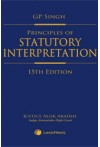- Author(s): Justice G.P. Singh, Justice Alok Aradhe
- Publisher: LexisNexis
- Edition: 15 Ed Rp 2024
- ISBN 13 9789391211028
- Approx. Pages 854 + contents
- Format Hardbound
- Approx. Product Size 24 x 16 cms
- Delivery Time 3-5 working days (within Kerala & South India) (Others 7-9 days)
- Shipping Charge Extra (see Shopping Cart)
............................................................................................................................
Description
The scope and ambit of fundamental rights have been enhanced and Right to Privacy as well as Right to Die with dignity has been recognized as fundamental rights. The right to peaceful protest has also been recognized as a fundamental right. A Constitution bench of the Supreme Court by a majority (4:1) struck down Article 124A of the Constitution, National Judicial Appointment Commission Act, 2014 and held that independence of judiciary is the basic feature of the Constitution. The supremacy of collegium system was reaffirmed. Even where positive law is clear, the wide amplitude of power under Article 142 empowers the court to pass an order which accords with justice. Another Constitution bench of Supreme Court while dealing with Land Acquisition Act, 2013 held that expression 'or' used in section 24(2) has to be read as 'nor' or as 'and" by placing reliance on principles of interpretation of positive and negative conditions' as stated in the previous editions of this book. Fair construction of penal statute based on purposive as well as literal interpretation is correct modern day approach. The daughters have a right in mercenary by birth and it is not necessary that father catercorner should be living when Hindu Succession (Amendment) Act, 2005 came into force. A nine judge bench of Supreme Court by a majority of (7:2) ruled that clauses (a) and (b) of Article 304 have to be read disjunctively.
............................................................................................................................
Contents
Chapter 1. Basic Principles
Chapter 2. Guiding Rules
Chapter 3. Internal Aids to Construction
Chapter 4. External Aids to Construction
Chapter 5. Subsidiary Rules
Chapter 6. Operation of Statutes
Chapter 7. Expiry and Repeal of Statutes
Chapter 8. Statutes Affecting the Crown or the State
Chapter 9. Statutes Affecting Jurisdiction of Courts
Chapter 10. Construction of Taxing Statutes and Evasion of Statutes
Chapter 11. Remedial and Penal Statutes
Chapter 12. Delegated Legislation
Appendix
............................................................................................................................
Author Details
Guru Prasanna Singh, M.Sc., LL.B., LL.D., (Hon.) Chief Justice, High Court of Madhya Pradesh, 1978-1984; Chairman, Madhya Pradesh Law Commission, 1990-1992; Lokayukt, Madhya Pradesh, 1992-1997
Justice Alok Aradhe

